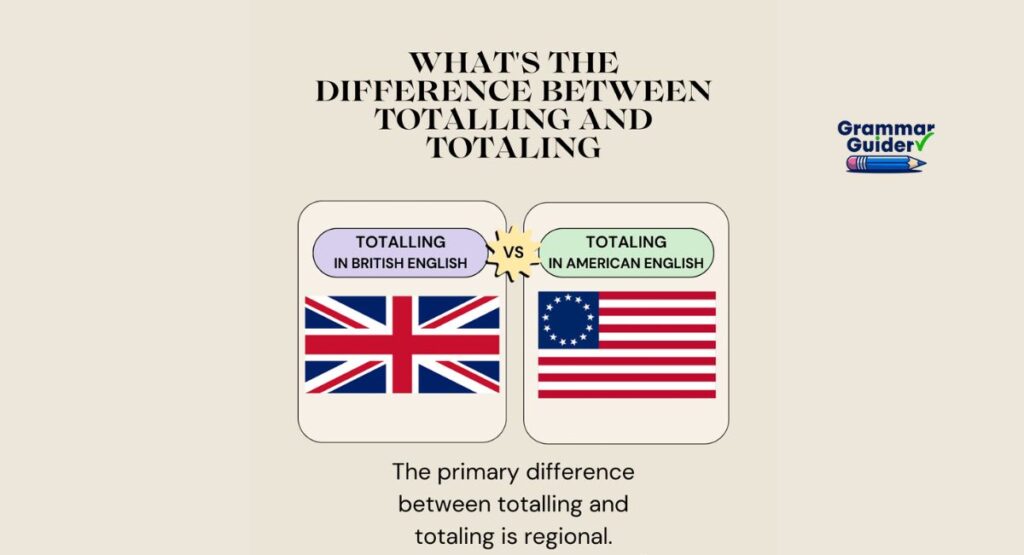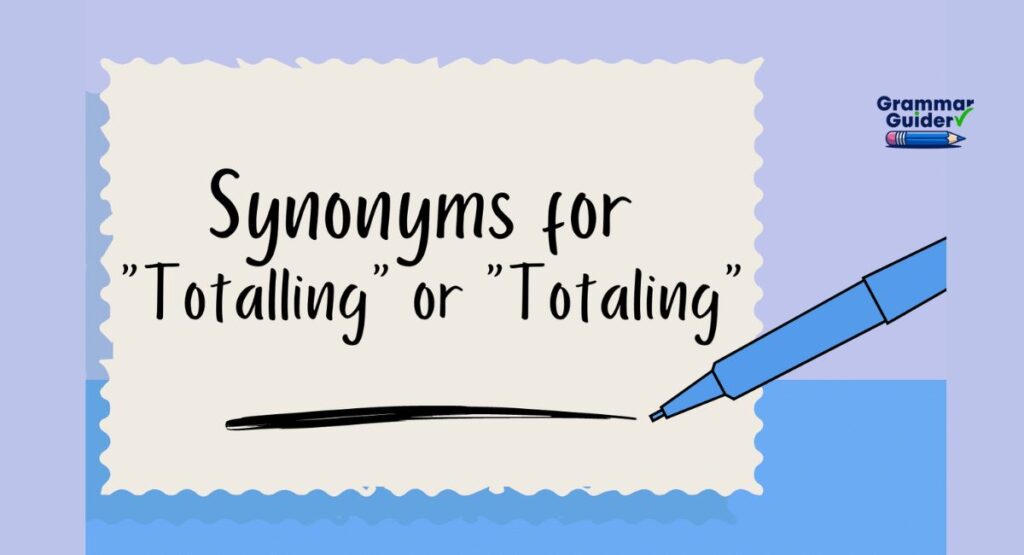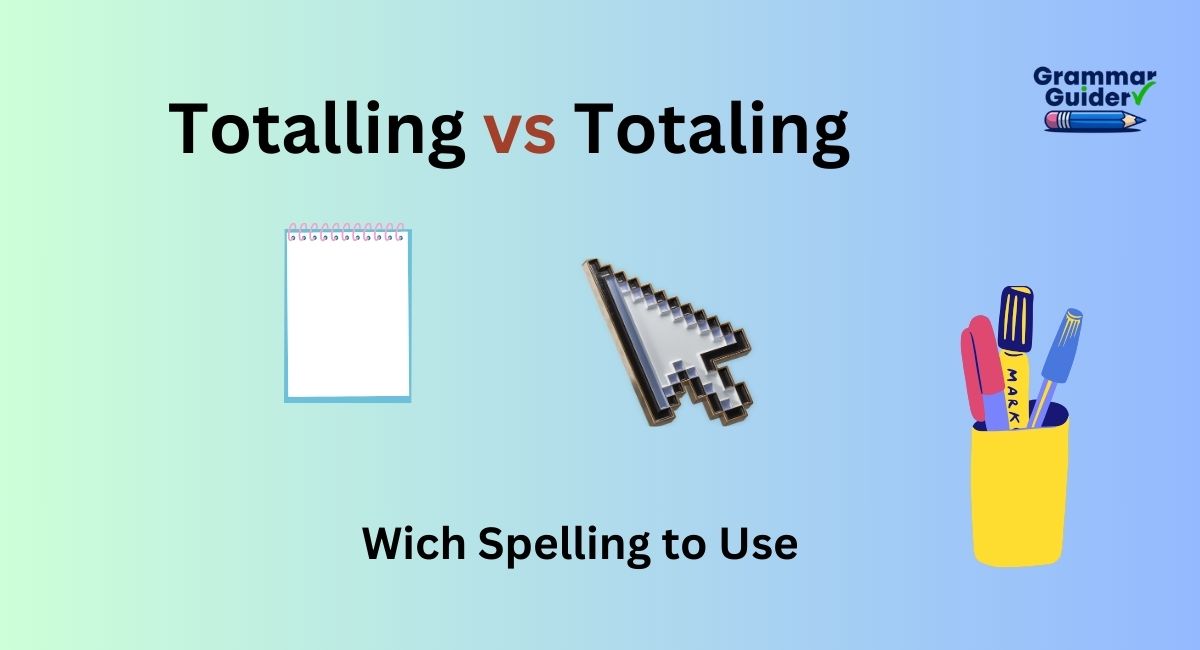Choosing between totalling and totaling can feel confusing especially when writing for different audiences. Both words mean the same thing adding up numbers or calculating a sum.
However, the preferred spelling depends on regional language differences: British English spelling uses totalling (with a double “l”) while American English spelling favors totaling (with a single “l”).
Understanding these spelling variations is not just about grammar it reflects unique language norms in English.
Recognizing the difference between British vs American English can help writers tailor content for specific audiences avoiding misunderstandings and ensuring clarity.
What do “Totalling” and “Totaling” Mean?
Totalling and totaling mean the same thing: adding numbers to find a total. The only difference is in spelling. British English spelling uses totalling with two “l”s while American English spelling uses totaling with just one “l.”
Both words come from the verb total. They describe the action of adding or calculating. These spelling variations help show where English is being used, like in British vs American English. Knowing these differences can help you write clearly.
“Totalling” or “Totaling”: What’s the Difference?

The main difference between totalling and totaling is how they are spelled. Totalling has two “l”s and is used in British English spelling.
On the other hand totaling has one “l” and is used in American English spelling. Both words mean the same thing: adding numbers together to find a total. Knowing this helps with clear writing.
| Feature | Totalling (British English) | Totaling (American English) |
|---|---|---|
| Spelling | Uses a double “l” | Uses a single “l” |
| Regional Preference | Preferred in British English | Preferred in American English |
| Meaning | Refers to adding numbers to reach a total | Refers to adding numbers to reach a total |
| Usage | Frequently used in British English writing | Frequently used in American English writing |
Why there is Confusion Between “Totalling” and “Totaling”?
The confusion between totalling and totaling started in the early 1900s. At that time American English changed how some words were spelled to make them simpler.
For example travelling became traveling. This change also happened with totalling which turned into totaling. These spelling variations can confuse people especially when they see both forms.
Many people learn English from different places. This means they might use British vs American English without knowing it.
When writing it is important to know which spelling to use. This helps make writing clear and easy to understand. Recognizing these differences will help everyone avoid mistakes.
Synonyms of “Totalling” or “Totaling”

- Adding up means putting numbers together.
- Summing is another way to say you are finding a total.
- Tallying is counting numbers one by one.
- Counting means finding out how many there are.
- Calculating means doing math to get a number.
- Summarizing means giving a short version of numbers.
- Adding together means to combine numbers.
- Tabulating means organizing numbers in a table.
- Aggregating means gathering all the numbers into one.
- Computing means using math to find an answer.
Using “Totalling” and “Totaling” in Sentences
When using totalling or totaling in sentences remember the spelling depends on the region.
British English uses totalling with two “l”s, while American English uses “totaling” with one “l.” Both mean adding numbers to find a total.
Totalling:
- Totalling is used in British English with two “l”s.
- You can say She is totalling her expenses for the school trip.
- Another example is The teacher is totalling the scores for the test.
- It means adding numbers together to find a total.
- Use “totalling“ when you write for a British audience.
Totaling:
- Totaling is used in American English with one “l.”
- You can say He is totaling the costs for his project.
- Another example is “The clerk is totaling the sales at the end of the day.”
- It means adding numbers together to find a total.
- Use totaling when you write for an American audience.
FAQ’s
What’s the difference between “totalling” and “totaling”?
Totalling is British English “totaling” is American English. Both mean adding up numbers.
Which is correct, “totalling” or “totaling”?
Both are correct. Use “totalling” in British English and “totaling” in American English.
Why does “totalling” have two “l”s in British English?
British English keeps the double “l” in verbs unlike American English which simplifies it.
Can I use “totalling” in American English writing?
It’s best to use “totaling” in American English for consistency and clarity.
Does “totalling” and “totaling” have the same meaning?
Yes, they both mean calculating a total or sum. The spelling difference is reg
Final Thoughts
The choice between “totalling” and “totaling” depends on where you are writing. British English uses ‘totalling’ with two “l”s, while American English uses “totaling” with one “l.”
Both words mean the same thing. They describe the action of adding numbers together to find a total. Knowing which spelling to use helps make writing clear.
Understanding these spelling differences is important for good communication. Writers should use the correct form based on their audience.
Using the right spelling makes writing easier to understand. Remember, whether you choose totalling or totaling both words serve the same purpose.
They help people express the idea of calculating sums. This knowledge will help everyone write confidently and correctly.
Read More Block:

Harley Rose is a seasoned expert in English grammar and writing tips, blending years of knowledge and a love for language into her work. With a sharp eye for detail and a talent for making grammar accessible, Harley shares practical insights that help readers write with precision and flair. Her content is ideal for anyone looking to strengthen their writing skills and express themselves with confidence.

